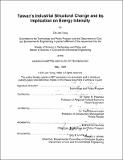| dc.contributor.advisor | Karen R. Polenske. | en_US |
| dc.contributor.author | Yang, Chi-Jen, 1971- | en_US |
| dc.contributor.other | Massachusetts Institute of Technology. Technology and Policy Program. | en_US |
| dc.date.accessioned | 2009-06-30T18:38:38Z | |
| dc.date.available | 2009-06-30T18:38:38Z | |
| dc.date.copyright | 1999 | en_US |
| dc.date.issued | 1999 | en_US |
| dc.identifier.uri | http://hdl.handle.net/1721.1/46265 | |
| dc.description | Thesis (S.M.)--Massachusetts Institute of Technology, Dept. of Civil and Environmental Engineering; and, (S.M.)--Massachusetts Institute of Technology, Sloan School of Management, Technology and Policy Program, 1999. | en_US |
| dc.description | Includes bibliographical references (leaves 42-43). | en_US |
| dc.description.abstract | The objective of this thesis is to analyze how the shift in industrial mix had contributed to the energy intensity in Taiwan. The concern for energy intensity is mainly because it is directly related to Carbon Dioxide (CO2) emission, and international negotiations on global climate change might lead to an international regulation of CO2 emission. The data for this study are the 1981-1984-1986-1989-1991 29-sector input-output tables of Taiwan. I derive not only direct total energy inputs and intensities, but also total energy requirements and intensities from the input-output data. I also use the shift-share analysis to demonstrate the contributions to energy intensity from national output growth, industrial mix shift, and efficiency shift. The total (direct and indirect) energy intensities provide a very different perception of each sector's energy consumption than the perception of direct energy intensities. In terms of total energy intensities, the electronic industry is more energy-intensive than the national average. The other service industries, although they are less energy-intensive than the national average in terms of both direct energy input and total energy requirements, did not help much in reducing national energy intensity. The industrial mix-effect is too small to play a significant role in reducing Taiwan's national energy intensity. Taiwan needs a more aggressive energy conservation policy to improve its energy efficiency; otherwise, any international regulation would be a serious threat to Taiwan's economic development. | en_US |
| dc.description.statementofresponsibility | by Chi-Jen Yang. | en_US |
| dc.format.extent | 34, A1-A16, B1-B18 p. | en_US |
| dc.language.iso | eng | en_US |
| dc.publisher | Massachusetts Institute of Technology | en_US |
| dc.rights | M.I.T. theses are protected by
copyright. They may be viewed from this source for any purpose, but
reproduction or distribution in any format is prohibited without written
permission. See provided URL for inquiries about permission. | en_US |
| dc.rights.uri | http://dspace.mit.edu/handle/1721.1/7582 | en_US |
| dc.subject | Civil and Environmental Engineering. | en_US |
| dc.subject | Technology and Policy Program. | en_US |
| dc.title | Taiwan's industrial structural change and its implication on energy intensity | en_US |
| dc.type | Thesis | en_US |
| dc.description.degree | S.M. | en_US |
| dc.contributor.department | Massachusetts Institute of Technology. Department of Civil and Environmental Engineering | en_US |
| dc.contributor.department | Technology and Policy Program | en_US |
| dc.contributor.department | Sloan School of Management | |
| dc.identifier.oclc | 43703892 | en_US |
